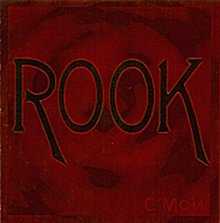 Rook is another one of those fascinating little discoveries that I love to spot and single out for attention. In this case, they came to me by way of Folk Tales‘ publisher, who sent C’mon to me with a side note stating that he thought I’d enjoy them.
Rook is another one of those fascinating little discoveries that I love to spot and single out for attention. In this case, they came to me by way of Folk Tales‘ publisher, who sent C’mon to me with a side note stating that he thought I’d enjoy them.
To my pleasant surprise, he was right. I didn’t just like Rook, I loved them. And coming from me, that’s high praise indeed. You see, I have a somewhat unfortunate flaw. I don’t like Celtic music on the whole. Oh, sure, I’ve been known to enjoy specific bands, or certain songs, or some styles. But on the whole, I’m not really a Celtic music fan. I don’t know why, but after a while, it all starts sounding the same to me.
Rook, on the other hand, is a refreshing breath of difference in a great many ways. For one thing, they satisfy my FHL rule about music.
FHL?
Faster. Harder. Louder. Yup, that’s right, I’m actually a rock ‘n’ roll fan.
Anyway, I learned this about Rook from the liner notes: They’re a Tacoma, Washington based group, formed in 1996 by Shane Scot (guitars and lead vocals), and Tim McCarthy (bagpipes, backing vocals). They stayed a duo for several years, working as a studio band. They picked up several more musicians in early 1999, in the form of John Rice (drums, percussion), Sarah Roark (fiddle, backing vocals), and Gary Thompson (bass). Once they worked the kinks out, Rook as we know it was born, “a five-piece band ready to play live, record albums, and establish a fan base.” C’mon is their first album.
Unfortunately, while everything on C’mon is original to Rook’s repertoire, it’s a short album, consisting of a mere five songs and a bonus … er, track that has to be heard to be believed. Also, unfortunately, they’re noted as being released on the dubiously-named “Fucking Kid Records.”
Don’t let either of those facts worry you. Rook has some serious potential, and a good future ahead of them, if they can maintain the quality I detected in what I’ve heard.
The first song, “Christine’s Troubles,” has a story to go with it, with the Christine of the title being Rook’s original fiddler, a lady who, shortly after being recruited, was evicted, engaged, and laid off, in that order. The song itself is a lively, fast-paced bagpipe-and-others tune that fully conveys the feeling of events spiraling out of control. It starts off quietly, with the bagpipes bringing us into the song slowly, setting up the anticipation. Then, after a suitable pause, it launches into a much less restrained attitude, the other instruments joining in. Round and round it goes, getting louder, faster, and harder with each moment, until finally, it pauses for another bagpipe solo, and then the other instruments come crashing back in, faster and faster, harder and harder, slamming home with a final push and crash.
Lord, but I’d hate to try and dance to it. I can’t even begin to convey the power of the song. On the basis of that song alone, I’m a fan.
Rook doesn’t slack off, either. The second song, “Look So Long” is a demented little tale of a man who leaves a woman, and then tries to convince her to take him back. Can we say, “Ooops?” This song introduces the talented vocals section of Rook’s abilities. You know how some bands can’t sing, and shouldn’t be allowed to? Well, Rook can sing. This tune’s lively in an entirely different way, and they manage to make their instruments speak for them. And trust me, anyone who’s ever been jilted by a capricious love will applaud the way this song turns out.
The third song is “Ironman,” named after the traditional J. Scott Skinner strathspey, but with Rook’s unique flavor added to it. It’s mainly notable for being the first collaboration between McCarthy and Scot. It’s something of a letdown compared to the first two songs, until you get about a minute into the bagpipe opening and the guitar tears in with a bass roar to undercut the traditional atmosphere with a modern feel. Not so disappointing now, if you ask me.
Next up is “Gypsy Charm,” described as a love-sick song with a pipe solo worth checking out. Rook slows down for this one, reintroducing us to their vocals, and their sense of humor. This is another one to dance to, as long as you can keep up.
The last song is “Dreaming of Spain.” The liner notes state that the first two songs in the set were inspired by the music of Galicia (described as a Celtic region at the northwest tip of Spain), while the song ends with a traditional Scottish jig, “Atholl Highlanders”. Like other Rook songs, it starts slowly, focusing on bagpipes, and then opens up with energy and enthusiasm. Ah, percussion. There is a drum solo nearly four minutes into the set that simply kicks ass, and it’s immediately followed with a powerful followup into a strong finish.
The bonus track has no name that I can tell, but if I was to name it, I’d call it “Messing Around,” since that’s basically what they do for about thirty seconds. It fades in some seconds after the previous song fades out, messes around, introduces us to the possible origins of “Fucking Kid,” and then dances on out the door.
Would I recommend Rook? Oh, in a heartbeat. They’re a rare cut above the best, one I thoroughly enjoyed, and one I’ll listen to again quite happily in the future.
(Fucking Kid Records, 1999)
